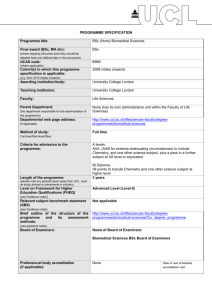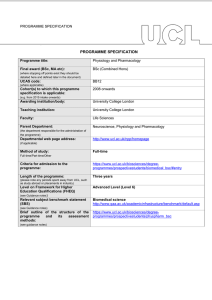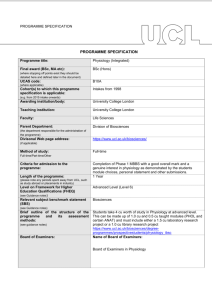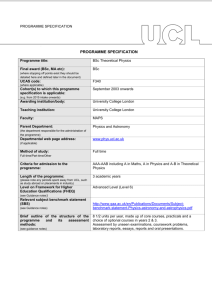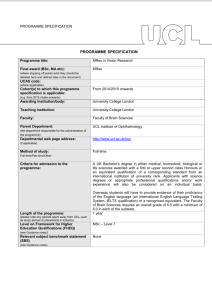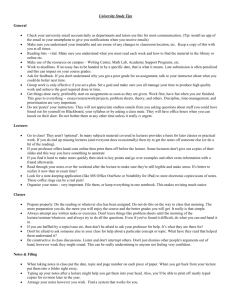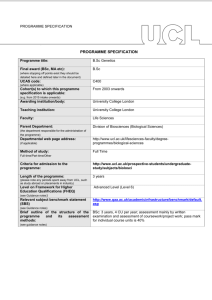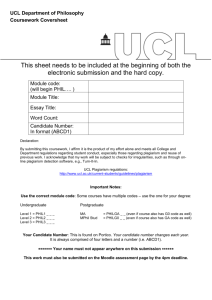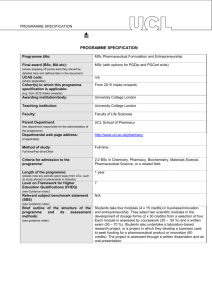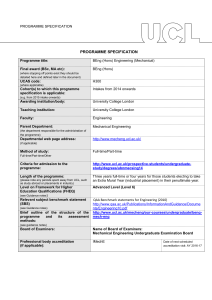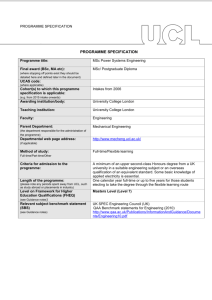BSc Physiology and Pharmacology
advertisement
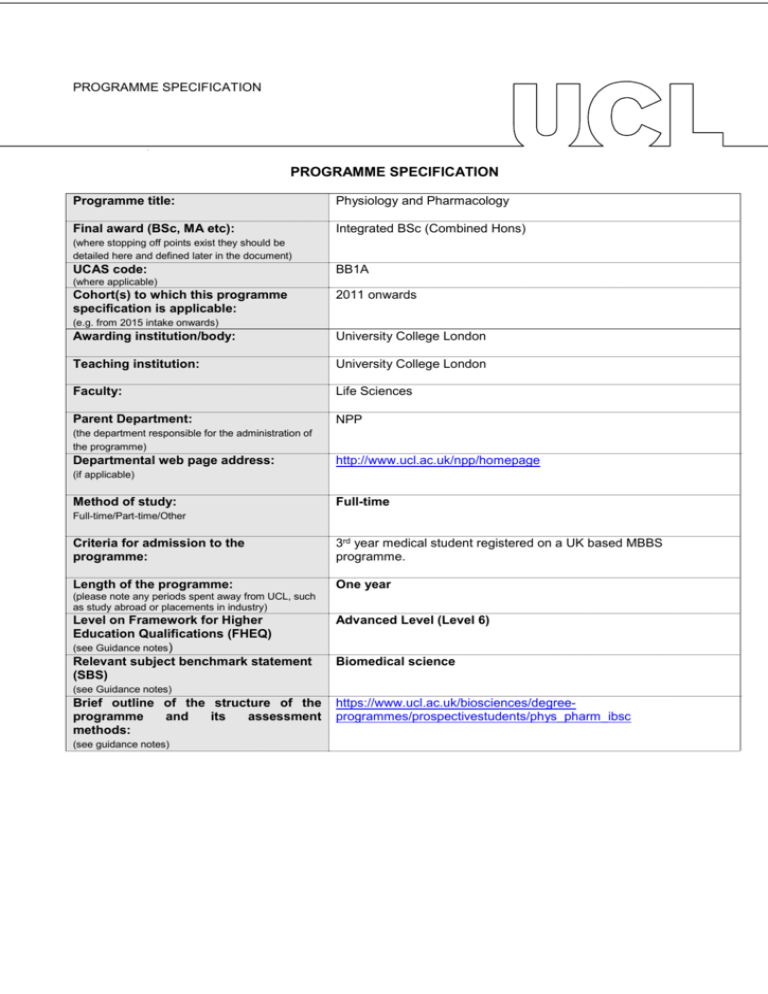
PROGRAMME SPECIFICATION PROGRAMME SPECIFICATION Programme title: Physiology and Pharmacology Final award (BSc, MA etc): Integrated BSc (Combined Hons) (where stopping off points exist they should be detailed here and defined later in the document) UCAS code: BB1A (where applicable) Cohort(s) to which this programme specification is applicable: 2011 onwards (e.g. from 2015 intake onwards) Awarding institution/body: University College London Teaching institution: University College London Faculty: Life Sciences Parent Department: NPP (the department responsible for the administration of the programme) Departmental web page address: http://www.ucl.ac.uk/npp/homepage (if applicable) Method of study: Full-time Full-time/Part-time/Other Criteria for admission to the programme: 3rd year medical student registered on a UK based MBBS programme. Length of the programme: One year (please note any periods spent away from UCL, such as study abroad or placements in industry) Level on Framework for Higher Education Qualifications (FHEQ) (see Guidance notes) Relevant subject benchmark statement (SBS) Advanced Level (Level 6) Biomedical science (see Guidance notes) Brief outline of the structure of the programme and its assessment methods: (see guidance notes) https://www.ucl.ac.uk/biosciences/degreeprogrammes/prospectivestudents/phys_pharm_ibsc Board of Examiners: Name of Board of Examiners: Board of Examiners in Physiology and Pharmacology Professional body accreditation (if applicable): N/A Date of next scheduled accreditation visit: EDUCATIONAL AIMS OF THE PROGRAMME: To recruit high calibre students from the medical degree programme and provide them with an understanding of the scientific investigation of human health and disease. Students are selected to intercalate the BSc degree between years 2 and 3 of the medical programme. Our teaching on the integrated BSc is informed by research and students are taught to develop the ability to evaluate critically both theories and evidence. We aim to produce graduates well-equipped for advanced study or research and for a wide variety of careers in medicine. PROGRAMME OUTCOMES: The programme provides opportunities for students to develop and demonstrate knowledge and understanding, qualities, skills and other attributes in the following areas: A: Knowledge and understanding Knowledge and understanding of: Teaching/learning methods and strategies: Delivery relies principally on lectures. These are research-based and subjects are probed in depth and critically discussed. The scientific literature is the primary source of information, with students reading recommended recent papers and also researching the literature independently, as learning becomes selfdirected. An experimental research project is normally expected to form a substantial component, in which a selected topic is investigated in depth in an established research laboratory. molecular pharmacology or cell signalling advanced courses in physiology and pharmacology an option to take an advanced course in a related biomedical science a selected biomedical research topic in depth specific advanced research techniques experimental design data interpretation and presentation Assessment: The end of year unseen written examinations are mostly of essay type and comprise the major form of assessment. Most individual course units also have marked coursework, consisting of essays, laboratory practical reports and in some cases, literature-based dissertations. All of these require acquisition of relevant knowledge from a range of sources and its interpretation. Literature-based dissertations are also accompanied by oral presentations with a discussion. These reveal depth and grasp of knowledge. Similarly, the research project dissertation, and its defence, test depth of knowledge in specific areas, as well as the ability to cope with complex ideas. B: Skills and other attributes Intellectual (thinking) skills: Teaching/learning methods and strategies: 1. analysis and integration of information gathered from a range of sources: experimental, published and electronic 2. critical evaluation and interpretation of evidence 3. construction of arguments and formulation of hypotheses using available lines of evidence 4. identification of problems and finding appropriate ways of solving them 5. development of creativity and independence of mind 6. an awareness of health and safety and of ethical issues in biomedicine All of the teaching and learning methods outlined in A contribute to the development of intellectual skills (1-6). Feedback is a key element and in written course work students are encouraged to produce coherent, insightful accounts (1, 2). Various exercises give students simulated or real datasets which allow them to practise in depth quantitative analysis and data interpretation. Guided and independent reading for supervised essays and dissertations, give confidence (2, 5). In the research project, there is continual interaction with supervisors (16). Feedback is also an important element in class discussions, in tutorial sessions, in interactions with demonstrators and teachers in practicals, and from teachers and peers in oral presentation sessions (1-6). Assessment: All the listed skills are tested in all the forms of assessment in A. In particular, the end of year examinations depend on the selection and presentation of relevant information and ideas (1-3). Coursework essays and literature-based dissertations also test skills 1-3. Laboratory practicals and other coursework require the (acquisition), analysis and interpretation of data, from which conclusions must be drawn and justified (25). In laboratory practicals in particular, students also need to deal with unexpected, unscripted, problems (26). The research project dissertation and its defence are indicators of skills 1-6. C: Skills and other attributes Practical skills (able to): Teaching/learning methods and strategies: 1. access scientific papers, reviews, specialist books and text books from library collections and electronic sources 2. perform experiments safely 3. use advanced techniques specific to the research project 4. design and plan an experimental study, selecting appropriate methods of investigation 5. collect, record, organise, process and evaluate experimental data Coursework essays and literature-based dissertations enable development of skill 1. Laboratory practicals provide opportunities for students to acquire skills 2 and 5. In the laboratory research project, students learn (or improve) skills 2-5. Teaching on data evaluation and statistics forms an element of many third year modules and the research project (5). Assessment: Coursework essays and literature-based dissertations are all marked by staff (1). Laboratory practicals are overseen by staff and demonstrators and reports are marked (2, 5). Project supervisors assess performance in the laboratory as part of their assessment (2-5) and the dissertation requires an understanding of current literature (1) as well as data evaluation (5). Written examinations indirectly test 1. D: Skills and other attributes Transferable skills (able to): Teaching/learning methods and strategies: 1. manage time, prioritise work, meet deadlines 2. use computers/IT to produce essays, reports and visual aids for oral presentations 3. communicate information and ideas effectively in written and oral form 4. to analyse and present numerical and graphical data effectively 5. work in co-operation with others, sharing resources 6. work independently and take responsibility for personal learning and development Effective time management is an essential skill. Advice is provided by course organisers and personal tutors (1). Use of computers/IT to prepare written work may be self-taught or acquired with peer help. Advice is also provided at tutorials and there is feedback from the marked work. Training courses are available to students who wish to have more formal teaching (2). Presenting information and ideas in written and oral form is improved by feedback from marked work and personal tutors advise on basic skills for writing essays and practical reports (3, 4). In laboratory practicals and in the project, it is important to be able to work effectively as a member of a group (5). At the same time, students are encouraged to become more autonomous (6). Note that guides on acquiring all the transferable skills are also provided on the College web site (http://www.ucl.ac.uk/keyskills/). Assessment: Completing coursework assignments on time and assembling the project report by the deadline (1). Marked coursework, including oral presentations gives evidence of skills 2-4, while successful practicals depend on 5. All forms of work in the intercalated BSc year provide evidence of independent thought and research (6). The following reference points were used in designing the programme: the Framework for Higher Education Qualifications (http://www.qaa.ac.uk/en/Publications/Documents/Framework-Higher-Education-Qualifications-08.pdf); the relevant Subject Benchmark Statements (http://www.qaa.ac.uk/assuring-standards-and-quality/the-qualitycode/subject-benchmark-statements); the programme specifications for UCL degree programmes in relevant subjects (where applicable); UCL teaching and learning policies; staff research. Please note: This specification provides a concise summary of the main features of the programme and the learning outcomes that a typical student might reasonably be expected to achieve and demonstrate if he/she takes full advantage of the learning opportunities that are provided. More detailed information on the learning outcomes, content and teaching, learning and assessment methods of each course unit/module can be found in the departmental course handbook. The accuracy of the information contained in this document is reviewed annually by UCL and may be checked by the Quality Assurance Agency. Programme Organiser(s) Dr Paola Vergani Name(s): Date of Production: 19th June 2008 Date of Review: February 2015 Date approved by Head of Department: February 2015 Date approved by Chair of Departmental Teaching Committee: Date approved by Faculty Teaching Committee February 2015 February 2015
